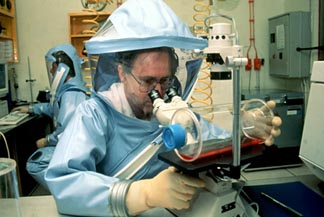Cornell virologist to study genetic mutation in avian flu virus at Australian biosecurity lab

ITHACA, N.Y. -- Next April, Cornell virologist Karel Schat will travel to Australia, not for a cold glass of Foster's beer in the outback but to study a disturbing genetic mutation in the avian flu virus at a high-security disease center for six months.
Schat will be seeking the answer to a vital question: Does this mutation increase the virus's virulence? He will be doing this work in Australia because there are no high-containment disease centers in the northeastern United States that permit handling of the highly pathogenic avian flu virus. Australia is also located along migratory paths for birds from Asia that could be carrying the virus.
Schat, a professor of avian virology and immunology at the College of Veterinary Medicine, next year will be "down under" April through June and October through December, wearing a full biosafety suit at the Australian Animal Health Laboratory, a wing of the Commonwealth Scientific and Industrial Research Organization (CSIRO) in Geelong, Victoria.
In collaboration with the U.S. Centers for Disease Control's influenza branch, which will supply the virus samples, Schat will study an observed change in a gene in the highly virulent avian influenza H5N1 virus and how that change influences the virus's virulence in chickens and ducks.
When researchers isolated the virus in the chickens that specifically infected humans in Asia, they found that its RNA, which is involved in copying the virus's genes, had produced an amino acid called glutamic acid. But when the same virus was isolated in humans after passing through human cells and making copies of its genetic material, the RNA substituted another amino acid called lysine in place of glutamic acid in about half the cases.
In China this year, barheaded geese had high rates of mortality when infected by the form of the virus with the lysine shift, while they survived the H5N1 with glutamic acid.
"The question I will ask is whether that difference is an important change to shift the pathogenicity of the virus," said Schat.
He will be researching whether the mutation that leads to lysine production has an effect on ducks and chickens; whether the virus changes again once it is reintroduced to birds; and whether birds can become vectors by carrying forms of the virus that infect mammals, including, of course, humans.
CSIRO will fund Schat's salary during his time in Australia.
Media Contact
Get Cornell news delivered right to your inbox.
Subscribe